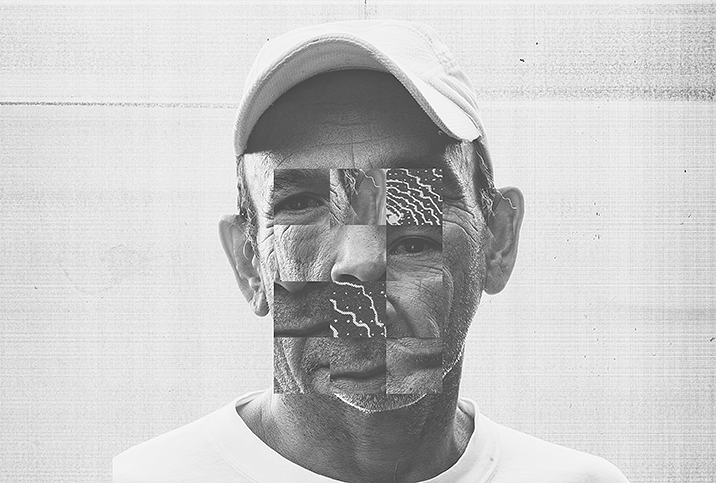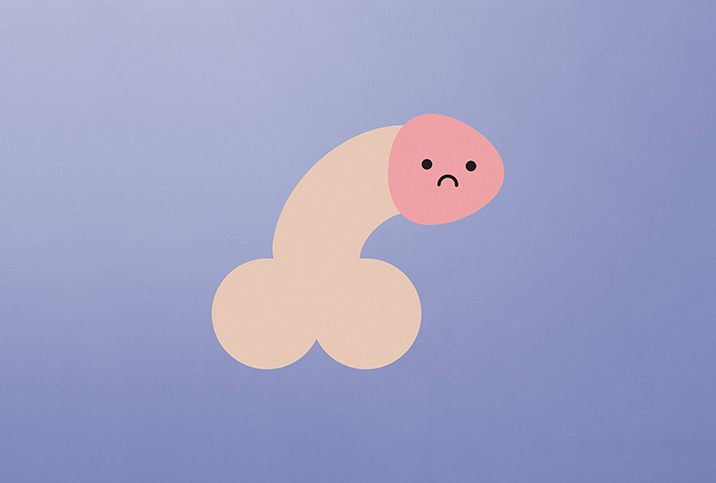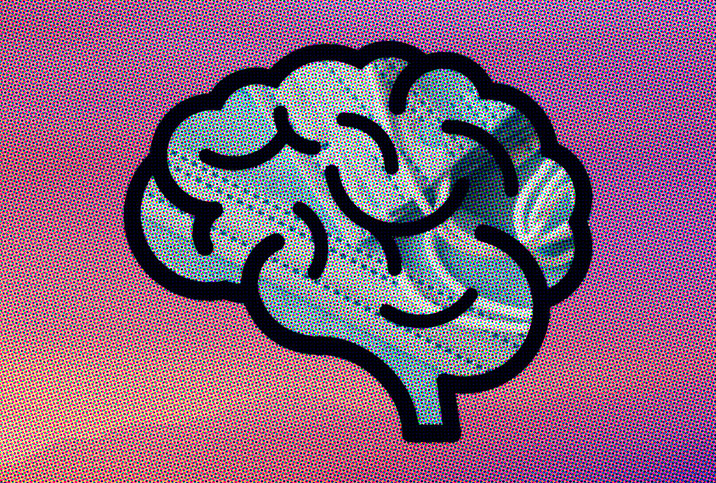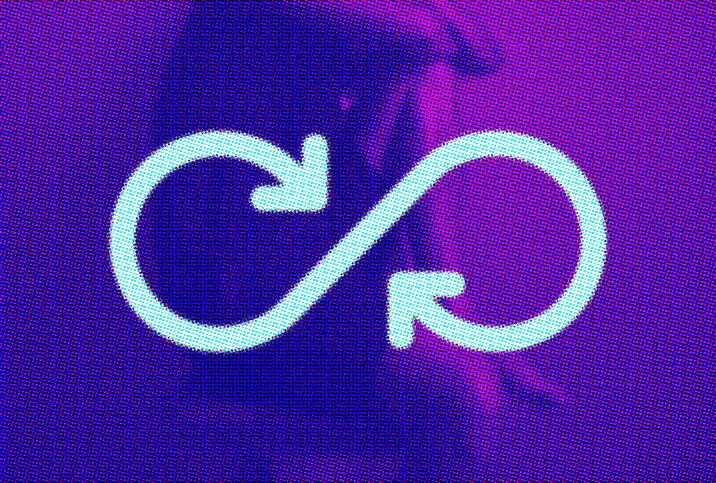How Cognitive Behavioral Therapy Can Revive Your Erection

For men who experience erectile dysfunction (ED), the disorder is often caused and perpetuated by psychological factors, such as anxiety and depression.
"In my experience, even if there is a medical cause or problems contributing to the ED, there are always thoughts, feelings and behaviors that can contribute or maintain the problem, as well," said Louis Pagano, Ph.D., a practicing psychologist in St. Cloud, Minnesota.
While many ED treatments—including oral medications, injections and physical therapies—address the physical causes, for some sufferers, cognitive behavioral therapy (CBT) is a solution for their erectile problems. CBT consists of different types of treatment that are based firmly on research findings, according to the Association for Behavioral and Cognitive Therapies (ABCT).
"We know from decades of research and experience that these approaches grounded in behavioral and cognitive science are really effective in aiding people in achieving specific goals and changes, and improving their quality of life," Pagano said.
Typical goals for CBT involve helping a patient change the way they act, behave, feel and think, or work toward a specific coping mechanism for their physical or medical problems, Pagano said.
"In cognitive behavioral therapy, the provider will typically focus more so on the current situation and how to address it rather than the past," he said. "They typically focus on a person's views and beliefs and behaviors versus their personality traits."
How does CBT address ED?
CBT is an educational therapy focused on building new skills that immediately impact the quality of life for an individual, according to Douglas Ruben, Ph.D., a licensed psychologist who practices in Okemos, Michigan.
Ruben said CBT protocols for correcting ED vary, but are generally fivefold:
- First, initial clinical assessment rules out underlying medical conditions warranting attention or treatment by a specialist before beginning CBT and to prevent accidental sabotage of CBT efficacy.
- Second, an assessment rules out other sexual disorders impacting erection potency and sustainability.
- Third, skill-building occurs to teach methods of penile arousal and incremental retention of the erection.
- Fourth, cognitive restructuring occurs to change the thinking or feelings associated with the pre-erection, erection and post-erection phases.
- Fifth, practice in multiple settings is vital. This transfers the newly learned skills under similar settings for personal confidence and skills-strengthening.
Anxiety and depression can escalate symptoms of ED, Ruben said. Anxiety about sexual performance, known as "anticipatory anxiety," can induce fear-restricting responses.
"A person fearing performance failure, for example, may avoid a sexual encounter, making excuses to the partner or adopting a 'phobia' to sex," he said. "Depression often describes the helplessness of repeating the same performance failure without reprieve and blaming oneself for imagined flaws, such as internal inadequacy, lack of virility and asexuality."
One of the associated symptoms of ED is negative thinking, Ruben added. Negative thinking creates downward spirals into self-blame, partner-blame and generalized blame.
"Self-blame is faulty self-debasements about being a poor lover, a weak person or getting angry to cover the embarrassment of performance failure," he said.
Self-blame usually repels the sufferer's partner from sex and the blamer, making the couple both asexual and unhealthy in their overall communication. Partner-blame is projecting fault onto the partner for some unmet need. In generalized blame, the blamer unloads a list of complaints, accusing the partner of wrong actions in the relationship as responsible for the ED.
CBT addresses all these concerns, according to Ruben.
Giddy psychologist Dr. Susan Ansorge breaks down the link between ED and depression in the ED Guide video series. Click here to watch the video.
Dismantling negative thinking and adjusting lifestyle
The cognitive restructuring components in CBT take aim at dismantling false beliefs about performance failures, Ruben said. The skills-building steps provide tools for self-control over erectile loss or premature ejaculation, thus replacing helplessness with helpfulness and predictability.
Ruben said strong candidates for CBT:
- Are medically healthy
- Are self-disciplined when given new skills to try
- Have no history of severe emotional or behavioral disorders
- Do not abuse alcohol or drugs
- Have a supportive partner
- Are motivated to change
CBT is also valuable for patients because it's not just about thoughts and feelings, such as stress, anxiety, guilt, depression and low self-esteem, Pagano said. A good CBT practitioner also addresses the ineffective or unproductive health and lifestyle choices that contribute to ED.
"The behavior in cognitive behavioral therapy is also really important," he said. "Lifestyle choices also contribute to things like heart disease and vascular problems, which raise the risk of ED. Smoking and drinking alcohol, being overweight and not exercising often are also causes of ED."
What the research says about CBT and ED
CBT is the most effective psychological treatment for a variety of problems, with findings suggesting its long-term effects are superior to those achieved by pharmacological treatments, according to Ana Luísa Quinta Gomes, Ph.D., a clinical psychologist and researcher at the Center for Psychology of Porto University in Porto, Portugal.
"CBT has been successfully applied to sexual problems," she said via email, adding that despite the knowledge about the role of psychological factors in sexual problems, the research focused on evidence‐based treatments for ED is scarce.
A 2013 systematic review and meta‐analysis of studies on the efficacy of psychological treatments for sexual problems indicated moderate effect sizes for improvements in symptom severity and sexual satisfaction. (Effect size is a quantitative measure of the relationship between two variables—the larger the effect size, the stronger the relationship.) The results suggest that psychological interventions are effective treatments for overall sexual dysfunction, according to Quinta Gomes.
She also noted results from two pilot studies indicated a combination of sildenafil (Viagra) and CBT led to better sexual functioning and sexual satisfaction in men with ED compared to pharmacological treatment alone.
Quinta Gomes conducts research at the Portuguese SexLab, testing the efficacy of CBT versus medication in the treatment of ED. Preliminary findings of a clinical study at the lab indicate CBT is as effective as medication, and CBT's effect at three- and six-month follow-ups is significantly greater than medication alone.
Steps to take with your partner
A man suffering from ED can take simple, specific actions with his partner, Pagano said.
"Find ways to rebuild or establish your emotional intimacy. Maybe that is scheduling a date night outside of the home, something that's not explicitly focused on sex," he said. "Use that time to share your feelings and get reacquainted with what is attractive or unique about your partner or yourself."
Many men who experience ED find it difficult to be affectionate outside of explicitly sexual experiences.
"You kind of pull back and become less affectionate in general," Pagano said. "Making sure you're adding those small expressions of affection, like a phone call, an affectionate note, hugs and hand-holding, can be really important to cope with and address not just the ED itself, but the consequences of having it in a relationship."
It's also important to talk about what's going well and what you want to be different in the bedroom, he added.
"Maybe you talk about adding something new to a sexual encounter: places, positions, techniques," Pagano said. "Talk about adding foreplay and providing more partner-guided stimulation."
The 'gold standard' of psychotherapy
Focusing on sensations rather than thoughts, performance and orgasms is a common sex therapy technique known as sensate focus, developed by the research team of William Masters and Virginia Johnson in the 1960s and '70s.
"The goal of sensate focus is to create intimacy and decrease performance expectation, pressure and anxiety," Pagano said.
The practice of cognitive behavioral therapy was also first developed in the 1960s. Sensate focus employs behavioral exercises and techniques, much like CBT.
"CBT is effective for so many things because so many of our problems, including medical conditions and sexual problems, are caused by or maintained by our thoughts, our feelings and our behavior," he said. "CBT is really the current gold standard of psychotherapy. It's the best we have at this time to help people improve their symptoms and their quality of life."


















